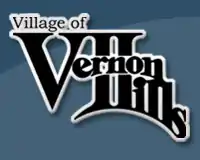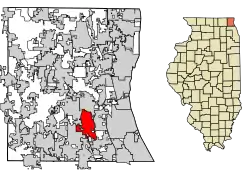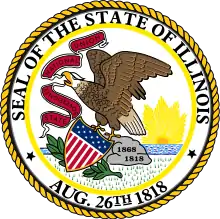Vernon Hills, Illinois
Vernon Hills is a suburb north of Chicago, Illinois in Lake County, Illinois, United States. The population was 20,120 at the 2000 census, and 25,113 in 2010. Vernon Hills serves as a retail hub for its surrounding area (Libertyville, Lake Forest, Long Grove, Lincolnshire and Buffalo Grove).
Vernon Hills | |
|---|---|
| The Village of Vernon Hills, Illinois | |
 | |
| Motto(s): "People Planning With Pride" | |
 Location of Vernon Hills in Lake County, Illinois. | |
.svg.png.webp) Location of Illinois in the United States | |
| Coordinates: 42°13′52″N 87°58′9″W | |
| Country | United States |
| State | Illinois |
| County | Lake |
| Township | Libertyville, Vernon |
| Settled | 1851 |
| Incorporated as village | June 16, 1958 |
| Government | |
| • Mayor | Roger Byrne |
| Area | |
| • Total | 7.94 sq mi (20.58 km2) |
| • Land | 7.74 sq mi (20.05 km2) |
| • Water | 0.20 sq mi (0.53 km2) |
| Population (2010) | |
| • Total | 25,113 |
| • Estimate (2019)[2] | 26,521 |
| • Density | 3,426.04/sq mi (1,322.80/km2) |
| Time zone | UTC-6 (CST) |
| • Summer (DST) | UTC-5 (CDT) |
| ZIP Code(s) | 60061 |
| Area code(s) | 847 & 224 |
| FIPS code | 17-77694 |
| Per capita income: | $40,411 (2010) |
| Home value: | $352,300 (2010) |
| Website | www |
History
The land that was to become Vernon Hills, founded by Richard Theodore Freese, Ron Freese, and Jim Carswell, began with the establishment of a 200-acre (0.81 km2) farm in 1857. Use of the land remained relatively static until the 1960s, when part of it was purchased for a residential community and golf course; the development was the first use of the name "Vernon Hills." On June 16, 1968, the village officially incorporated with 123 residents and 125 houses in a single subdivision built by Quinn Hogan and Barney Loeb.[3] During these times, the village and police department were run from a local motel until 1971 when village trustees bought two portable buildings.[3] It saw steady but slow growth until the annexing of a plot of land near the corner of IL-60 and IL-21 in 1971, which led to the building of 1,200,000-square-foot (110,000 m2) Hawthorn Center. By 1980, the village's population had grown to almost 10,000 residents, and by 2000, it had surpassed 20,000.
Through the 1980s and 1990s, the village grew geographically through the annexation of surrounding areas. This included land that would become the Corporate Woods business park and Centennial Crossing residential development (1986), a 1,200-acre (4.9 km2) section of Hawthorne-Mellody Farms (1988), and part of the village of Half Day (1994). In 2000, the village acquired land that had belonged at different times to the U.S. Army as a Nike missile base, the U.S. Navy as a naval training center, and the Curtiss Candy Company; it was converted to what is now the 184-acre (0.74 km2) Vernon Hills Athletic Complex (VHAC).
Geography
According to the 2010 census, Vernon Hills has a total area of 7.917 square miles (20.50 km2), of which 7.71 square miles (19.97 km2) (or 97.39%) is land and 0.207 square miles (0.54 km2) (or 2.61%) is water.[4]
Climate
| Climate data for Vernon Hills, Illinois | |||||||||||||
|---|---|---|---|---|---|---|---|---|---|---|---|---|---|
| Month | Jan | Feb | Mar | Apr | May | Jun | Jul | Aug | Sep | Oct | Nov | Dec | Year |
| Average high °F (°C) | 32 (0) |
36 (2) |
45 (7) |
57 (14) |
68 (20) |
78 (26) |
83 (28) |
81 (27) |
74 (23) |
62 (17) |
49 (9) |
36 (2) |
58.416 (14.68) |
| Average low °F (°C) | 16 (−9) |
19 (−7) |
28 (−2) |
38 (3) |
47 (8) |
57 (14) |
63 (17) |
62 (17) |
54 (12) |
42 (6) |
33 (1) |
20 (−7) |
36.916 (2.73) |
| Source: [5] | |||||||||||||
Demographics
| Historical population | |||
|---|---|---|---|
| Census | Pop. | %± | |
| 1960 | 123 | — | |
| 1970 | 1,056 | 758.5% | |
| 1980 | 9,827 | 830.6% | |
| 1990 | 15,319 | 55.9% | |
| 2000 | 20,120 | 31.3% | |
| 2010 | 25,113 | 24.8% | |
| 2019 (est.) | 26,521 | [2] | 5.6% |
| U.S. Decennial Census[6] | |||
As of the census[7] of 2010, there were 20,120 people, 7,568 households, and 5,312 families residing in the village. The population density was 2,708.3 people per square mile (1,045.5/km2). There were 7,813 housing units at an average density of 1,051.7 per square mile (406.0/km2). The racial makeup of the village was 81.86% White, 1.69% African American, 11.67% Asian, 0.10% Native American, 0.03 Pacific Islander, 2.92% from other races, and 1.72% from two or more races. Hispanic or Latino of any race were 7.19% of the population.
There were 7,568 households, out of which 42.3% had children under the age of 18 living with them, 59.2% were married couples living together, 8.4% had a female householder with no husband present, and 29.8% were non-families. 24.8% of all households were made up of individuals, and 5.9% had someone living alone who was 65 years of age or older. The average household size was 2.66 and the average family size was 3.24.
In the village, the population was spread out, with 29.2% under the age of 18, 6.4% from 18 to 24, 36.8% from 25 to 44, 21.6% from 45 to 64, and 6.1% who were 65 years of age or older. The median age was 34 years. For every 100 females, there were 93.7 males. For every 100 females age 18 and over, there were 89.8 males.
The median income for a household in the village was $101,297, and the median income for a family was $123,806. Males had a median income of $94,807 versus $78,136 for females. The per capita income for the village was $72,219. About 0.9% of families and 1.2% of the population were below the poverty line, including 3.0% of those under the age of 18 and 6.8% of those ages 65 and older.
In 2011 Vernon Hills had 4,858 persons of Asian ancestry, 19.3% of the village's population, the sixth highest percentage of Asians of any Chicago suburb. The Asian population figure was more than twice that of 2001. John Kalmar, the village manager, said that despite the increase from 2001 to 2011, "We haven't seen a specific increase in Asian-oriented types of businesses, and I haven't noticed in any significant way changes in what businesses are carrying."[8]
Schools
There are six grade schools in the village served by the Hawthorn School District. In 2006, Hawthorn Junior High School was formally divided into Hawthorn Middle School North and Hawthorn Middle School South. High school students, who formerly went to Libertyville High School, now attend (as of 2000-2001) either Vernon Hills High School or Libertyville High School.
Students living in the southwest corner of Vernon Hills attend Long Grove grade schools (Country Meadows & Woodlawn). Some subdivisions in southern Vernon Hills send students to Lincolnshire schools, including Adlai E. Stevenson High School. A small area in the southwest corner of the village is zoned to attend the high school in Mundelein, IL.
Elementary Schoolers may be enrolled in 4 different Hawthorn Schools. Hawthorn Elementary South, Hawthorn Elementary North, Aspen Elementary, or Townline Elementary. Currently, a Kindergarten Building is being constructed, expected to be finished by the school year of 2021. This may be delayed due to Covid-19.
Library
Vernon Hills is one of six communities which, in part, comprise the Cook Memorial Public Library District. The Evergreen Interim library, which was one of the District's two library facilities, closed on July 3, 2010. On July 10, 2010 the new Aspen Drive Library opened to the public. This 20,000-square-foot (1,900 m2) building is located across the street from the Vernon Hills Elementary and Grade School Campus at 701 N Aspen Drive.
The Aspen Drive Library in Vernon Hills is the village's first full-service library. The new library is 20,000 sq. ft. and offers 120,000 volumes of books, movies and music. The library also has an interactive children's department, a high-tech teen area, a state-of-the-art computer lab, small group study spaces and community meeting rooms.[9]
The remainder of Vernon Hills is in the Vernon Area Public Library District.
Economy
- CDW, a provider of technology products and services for business, government and education, is based out of Vernon Hills.
- Zebra Technologies, a manufacturer of thermal bar code label and receipt printers used by over 90 percent of Fortune 500 companies, is based out of Vernon Hills.
- American Hotel Register Company, a well-known manufacturer and supplier of hospitality products and services, is based out of Vernon Hills.
- Rust-Oleum Corporation, a worldwide leader in protective paints and coatings for both home and industry, is based out of Vernon Hills.
- Elorac, Inc., a specialty pharmaceutical company focused on advancing treatments in dermatology, is based in Vernon Hills.[10]
- Cole-Parmer, a scientific and industrial instrument distributor
Recently, Vernon Hills developed a former 52 acre soybean field into a $200 million dollar shopping center known as Mellody Farm, whose tenants are a host of restaurant and retail businesses.[11]
When Tiger Electronics was an independent company, its headquarters were in Vernon Hills.[12][13]
Top employers
According to the Village's 2014 Comprehensive Annual Financial Report,[14] the top employers in the city are:
| # | Employer | # of Employees |
|---|---|---|
| 1 | Hawthorn Mall | 2,500 |
| 2 | Zebra Technologies (HQ) | 900 |
| 3 | American Hotel Register (HQ) | 400 |
| 4 | Mitsubishi Electric Automation | 400 |
| 5 | CDW (HQ) | 350 |
| 6 | Cole-Parmer (HQ) | 300 |
| 7 | ZF | 240 |
| 8 | Richard Wolf | 200 |
| 8 | ETA hand2mind | 190 |
| 10 | Rust-Oleum (HQ) | 180 |
| 11 | Experient | 160 |
Transportation
Vernon Hills has a station on Metra's North Central Service, which provides daily rail service between Antioch, Illinois and Chicago, Illinois (at Union Station). It is also serviced by Pace buses.
Politics
Vernon Hills lies in the Illinois 10th Congressional District.
Notable people
- Sam Acho, football player
- Alex Brown, football player
- Desmond Clark, football player
- Tarik Cohen, football player
- DaVaris Daniels, football player
- Phillip Daniels, football player and coach
- David Dobrik, YouTuber
- Natalie Mariduena, Influencer
- Steve Dubinsky, hockey player
- Leonard Floyd, football player
- Robert P. Hanrahan, politician
- Devin Hester, football player
- Christopher Howarth, figure skater
- Kathleen A. Ryg, politician
- Carol Sente, politician
- Evan Spencer, football player
- Tim Spencer, football player and coach
- Nathan Vasher, football player
- Kevin Walter, football player
- Cody Whitehair, football player
Nearby places
References
- "2019 U.S. Gazetteer Files". United States Census Bureau. Retrieved July 14, 2020.
- "Population and Housing Unit Estimates". United States Census Bureau. May 24, 2020. Retrieved May 27, 2020.
- "History of Vernon Hills". Village of Vernon Hills. Retrieved April 7, 2017.
- "G001 - Geographic Identifiers - 2010 Census Summary File 1". United States Census Bureau. Archived from the original on 2020-02-13. Retrieved 2015-12-25.
- "Vernon Hills, IL (60061) Monthly Weather Forecast". Vernon Hills, IL (60061). Weather.com. 2016. Retrieved 14 September 2016.
- "Census of Population and Housing". Census.gov. Retrieved June 4, 2015.
- "U.S. Census website". United States Census Bureau. Retrieved 2008-01-31.
- Selvam, Ashok. "Asian population booming in suburbs." Daily Herald (Arlington Heights, Illinois). March 6, 2011. Retrieved on June 19, 2013. "Vernon Hills, for example, saw its Asian population more than double in the decade to 4,858 — almost 20 percent of the village's population. And yet that change has not led to any marked changes in Vernon Hills' business landscape. "We haven't seen a specific increase in Asian-oriented types of businesses, and I haven't noticed in any significant way changes in what businesses are carrying," Village Manager John Kalmar said."
- "Cook Memorial Public Library District". Retrieved 14 August 2012.
- "Elorac, Inc. Announces Orphan Designation in Europe for Novel Topical Treatment for Cutaneous T-Cell Lymphoma (CTCL)". Business Newswire. New York. November 15, 2012.
- https://www.chicagotribune.com/suburbs/mundelein/news/ct-vhr-mellody-farm-anchor-opening-preview-tl-0913-story.html
- Business Week, Issues 3525-3528. McGraw-Hill, 1997. Retrieved from Google Books on December 7, 2010. "Later on this month, Tiger Electronics Inc. in Vernon Hills[...]"
- Kirschner, Suzanne Kantra. "What's New." Popular Science, Bonnier Corporation. October 1997. Vol. 251, No. 4. ISSN 0161-7370. 17. Retrieved from Google Books on December 7, 2010. "Tiger Electronics, 980 Woodlands Pkwy., Vernon Hills IL 60061."
- Village of Vernon Hills 2014 CAFR

